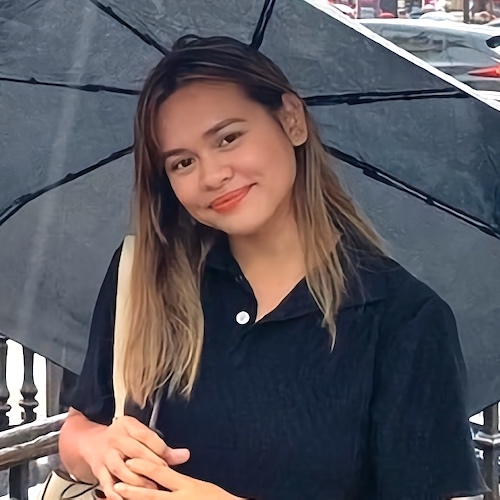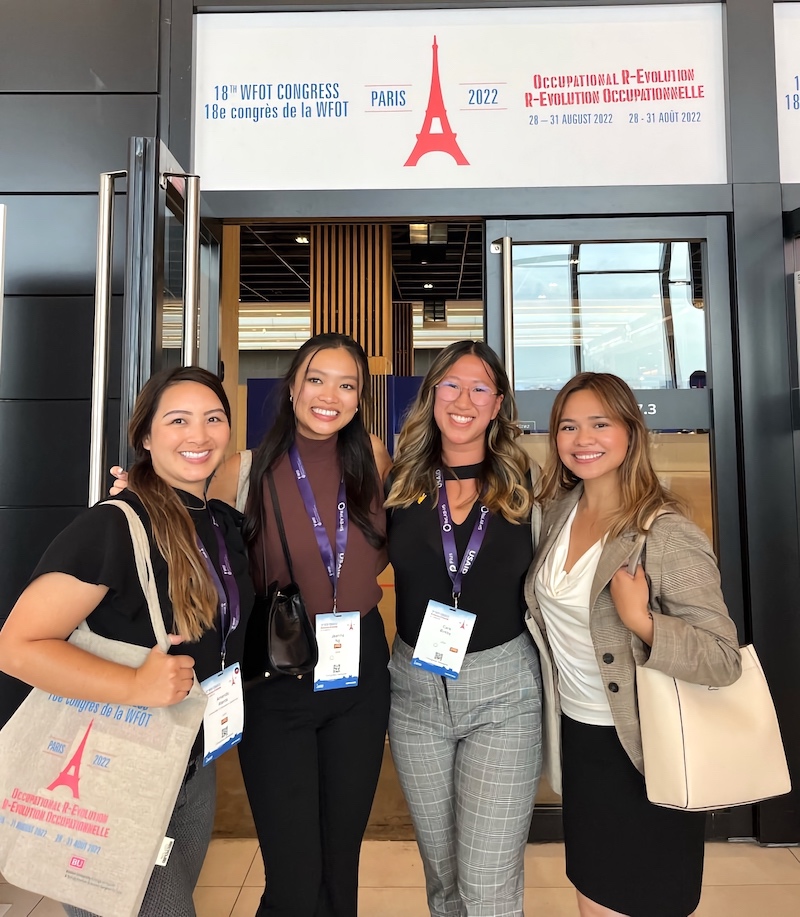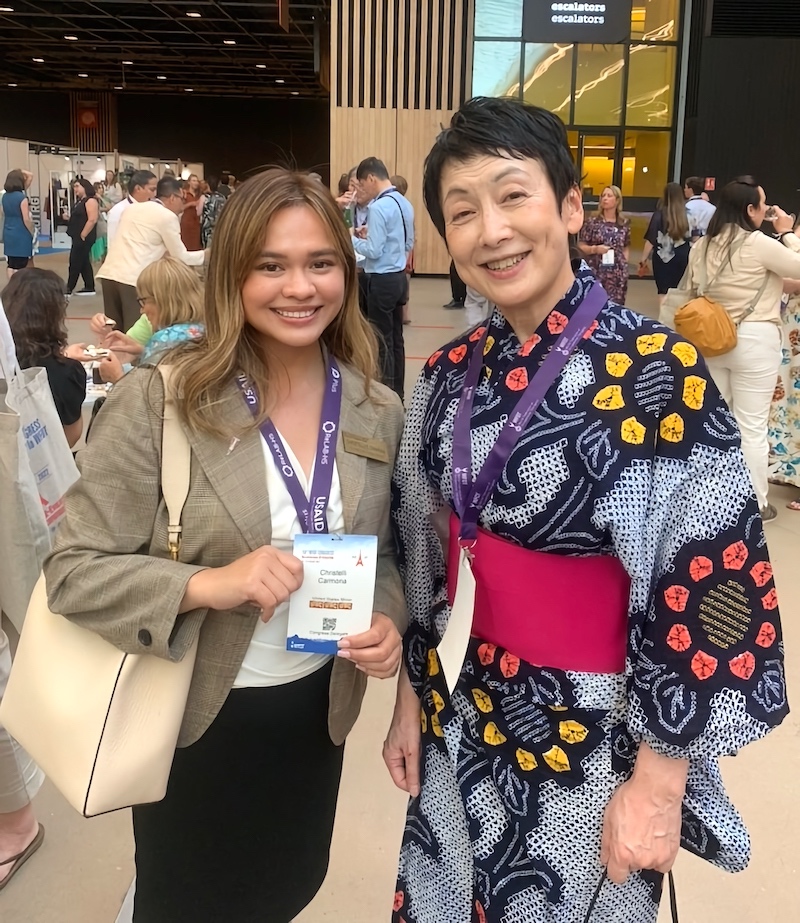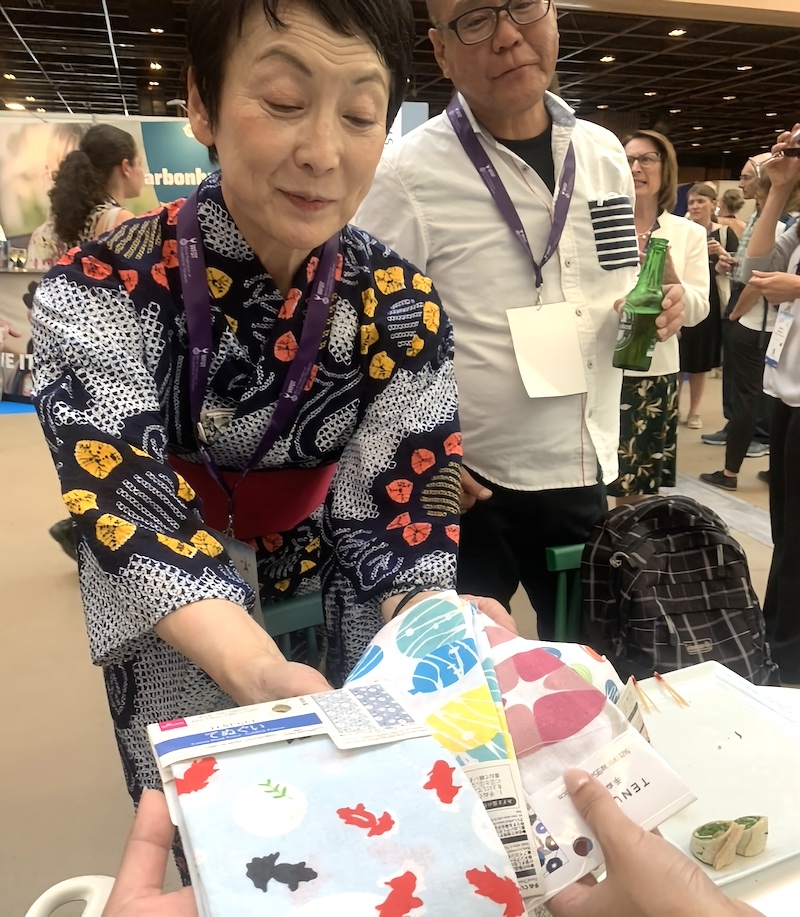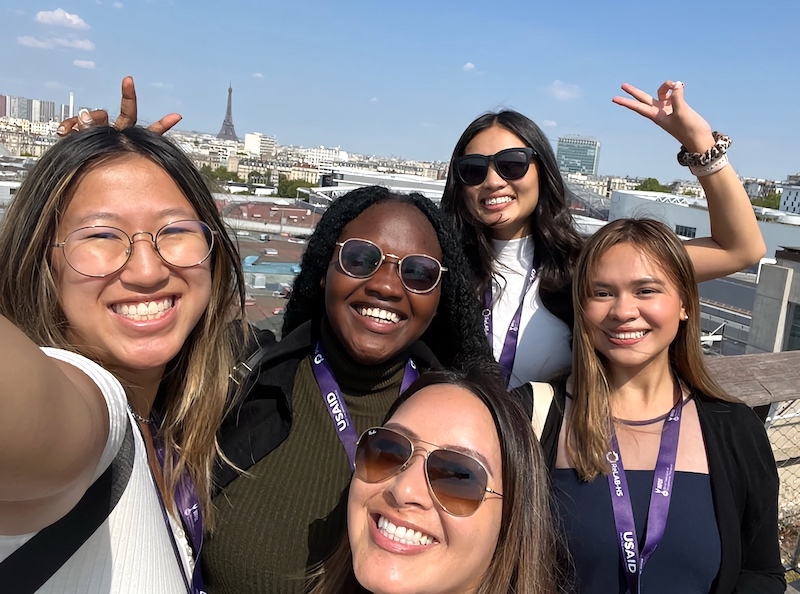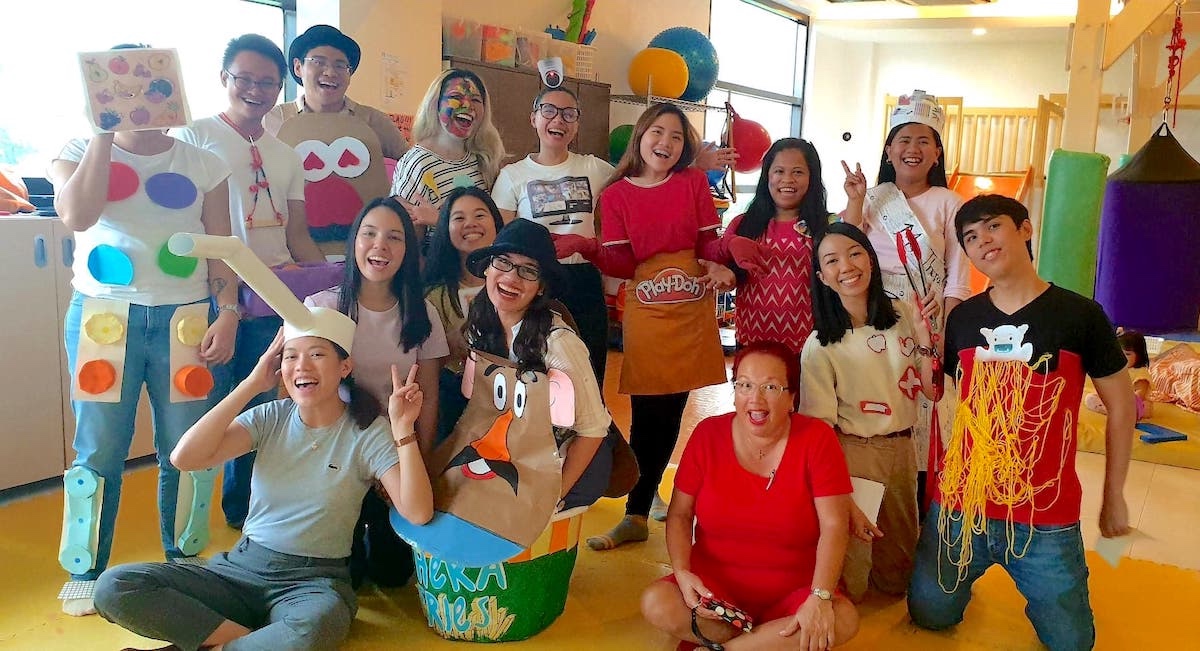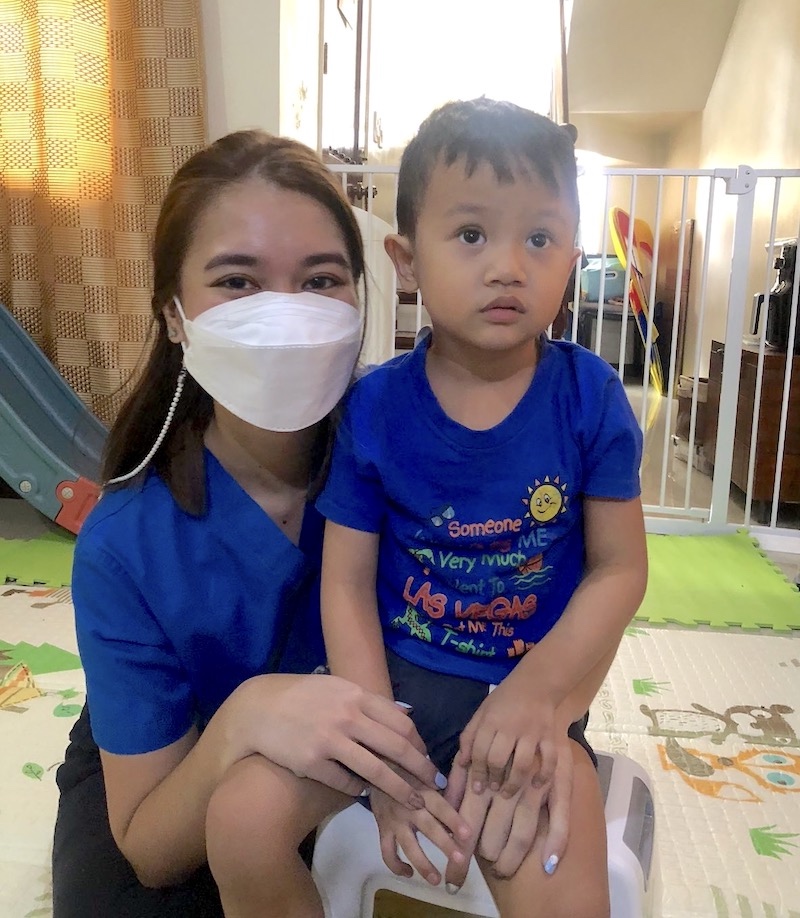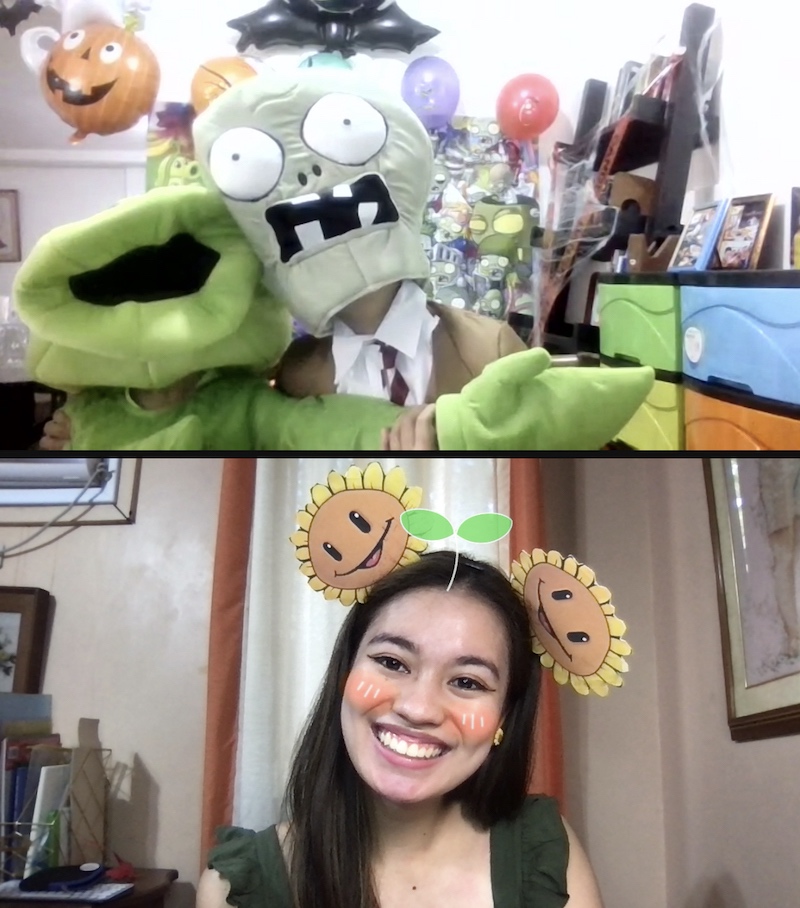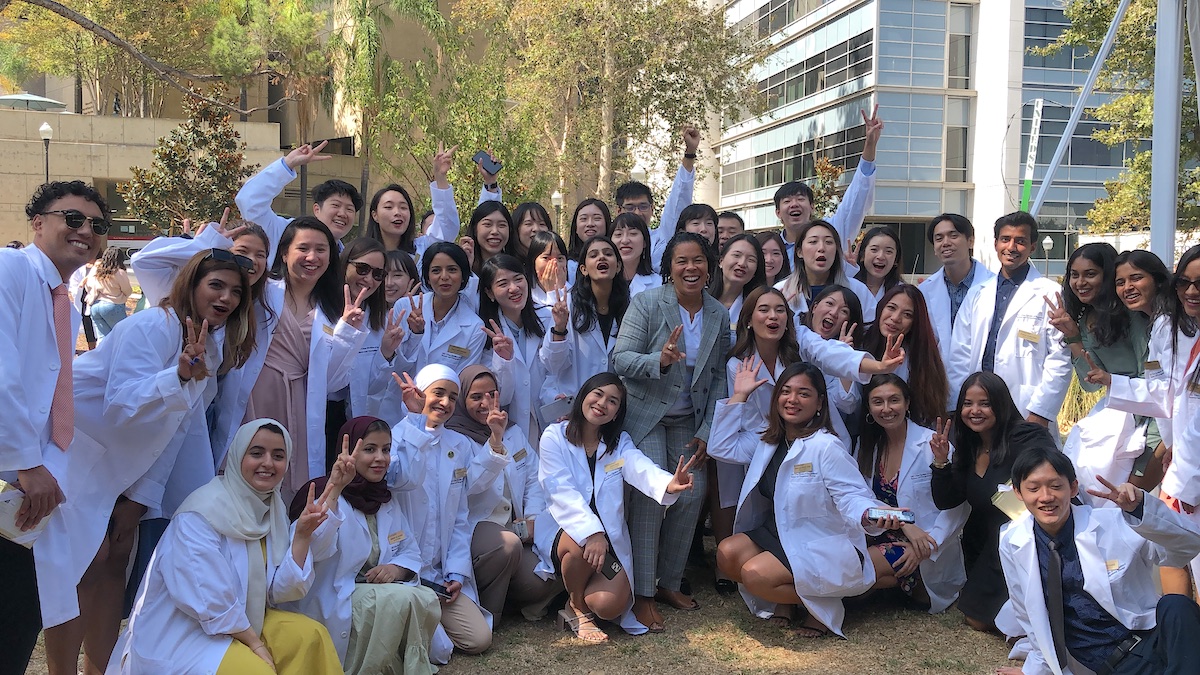Student Blog
WFOT Conference: Who Am I to Even Network? ⟩
October 25, 2022, by Global Initiatives Team
By Christelli Carmona, MA ’23
Edited by Abby Khou, Entry-Level Professional Master’s student
When I hear of networking, I think of sharp blazers, stern handshakes and well-groomed speeches about how accomplished you are. Because of that, I never saw myself as someone who could go out there and network. I mean, who am I to network? I cannot consider myself established in our profession. I am not even a licensed OT yet. I have not even attempted taking the infamous NBCOT and still do not have a perfect spiel explaining what occupational therapy is. So why would they want to talk to me? I am just a student who still turns in her assignments late. I guess you can say that I show symptoms of imposter syndrome.
However, one random interaction on a long, typical day at work selling sandwiches changed that mindset. It was a busy afternoon at work with long lines of customers when a man wearing a USC hat approached me at the counter. As a staff, we were encouraged to initiate small talk with guests. Naturally, I pointed at an easy conversation starter: “Oh you go to USC too?!” He then followed with, “Yes, I am actually the admissions officer for the school of Business.” Definitely not the response that I was expecting. As I assisted him with his order, I quickly chatted with him about his work, and he asked me about our OT program. I finished assisting him with his transaction, and we thanked each other for our time in the end.
The next day, I saw that he had connected with me via Linkedin and sent me a message thanking me for my service and the good food. He told me to reach out to him whenever I needed help with any business-related questions. Without even knowing it, I had just networked with the USC business school admissions committee. Although I do not think I will be applying to business school anytime soon, it was a connection that I valued and appreciated.
Fast-forward to the WFOT (World Federation of Occupational Therapists) conference that was held in Paris, France, this past August, I found myself in a complete 180 — the student who thinks she is not worthy to network because she turns in her assignment late and because she thinks she’s not accomplished enough was successfully networking with Japanese OTs and OT students around the world.
MA-II students Amanda Atenta, MA ’23, Jeanina Ng, MA ’23, Cara Birkby, MA ’23 and Christelli Carmona, MA ’23 at the WFOT Conference 2022 held in Paris, France
I have dreamt of doing my level II fieldwork in Japan for a long time, but I did not have any connections or know of any possible placements in Japan. I was so determined and passionate about doing my fieldwork in Japan that I was willing to talk to anyone at the conference who may be able to point me in the right direction. On the first day of the conference, I scouted for people who might be able to help me. I then saw two people reading a Japanese magazine. Unassumingly, I approached them and asked what country they were from, to which they responded, “Japan.” I was so excited to hear that they were from Japan and I started to talk to them about my admiration for their country. A simple conversation sparked a lengthy and amicable conversation about OT in Japan, which ensued in a friendship between Japanese OT professors and a USC OT student who never imagined that she was even qualified to network.
At the end of our conversation, one of the OTs kindly offered to host me at her home in Japan if I ever did fieldwork there. I was astounded and touched by her kind and generous offer. She also handed me a handkerchief from Japan as a parting gift, which also warmed my heart. I will always cherish her gift, but I will treasure the connection and friendship we made even more.
Christelli Carmona MA ’23 with Dr. Yoshimi Yuri of Morinomiya University of Medical Sciences in Osaka, Japan
At the end of that day, it was not stern handshakes, crisp suits, sharp blazers or self-promoting tidbits from my Linkedin profile that connected me with these wonderful people around the world — it was kindness and a shared passion (for OT) that manifested these connections and friendships.
“Networking” at the conference, but we like to call it making global friends! We met friends from Switzerland, Germany and Paris!
If there is anything I learned from working at my old job selling sandwiches, it is that networking can happen anytime and during the most unexpected times. In addition, I realized that you should probably wear your USC merch more often to increase your chances of networking with people within the USC network.
In all seriousness, I learned that networking is not a task that needs to be attached to a prerequisite of having accomplishments to boast about. All that it necessitates is for you to be yourself and the desire to connect with others with kindness and a shared passion for something.
So go out there, be kind, stay passionate, and most importantly, be yourself — you are your greatest asset.
With our new friend from Ghana, Myra Tindogo, who we also met and became friends with at the conference!
⋯
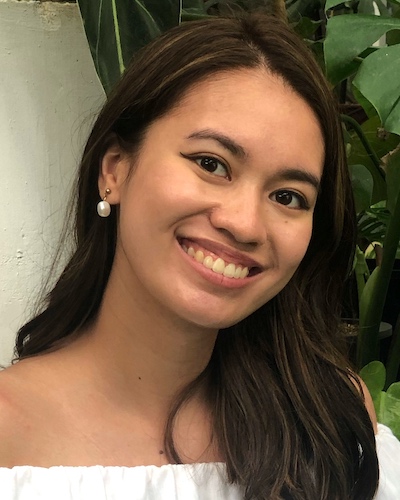
10 Things I Hate About Occupational Therapy ⟩
October 19, 2022, by Mika
The other night I was watching the classic romantic comedy, 10 Things I Hate About You, featuring the spunky Julia Stiles and the ever-so-charming Heath Ledger. Though I thoroughly enjoyed the scene of Patrick (Heath) dancing to Can’t Take My Eyes off You to swoon Kat (Julia), I think my favorite scene would still be the one where a tearful Kat lists down the 10 things she hates about Patrick in front of their whole class.
This scene got me thinking of a new idea for a blog post; and since World OT Day is coming, why not write a blog about 10 things I hate about OT?! Ironic, I know, but bear with me in this one.
So, without further ado, here are 10 things I hate about occupational therapy:
1. I hate that there is a lack of OTs.
2. I hate how OT services are viewed as a “privilege,” creating a lack of accessibility, especially for clients living in rural areas.
Back home in the Philippines, occupational therapy is deemed to be a profession in demand as there are more patients compared to the number of OTs. Although this may be a good thing for us in terms of job security, it is not quite ideal since a lot of patients who need our services are not receiving them immediately due to long waitlists and financial constraints. Most especially in rural areas, a lot of clients are usually left at home without proper care due to these issues. It is definitely not the best feeling to know how to help these clients but unable to do so due to lack of resources, time, and energy.
3. I hate how most OT principles are mostly based on Western perspectives.
Currently, I am taking a class in Occupational Science where my classmates and I are divided into small groups to discuss common issues in the practice of OT. One issue we discussed was that OT principles, frameworks, and models were mostly based on Western perspectives, making it difficult at times to adapt to non-Western cultures. With this, I think OTs, especially those who come from non-Western countries, should strive to adapt and promote their own culture and expertise to make the current knowledge more global.
4. I hate when some patients think OT is “magic” like a prescribed drug.
I say this not with the intention to put blame or shame on anyone, but rather, to put to light how a medical perspective is still favored over a more holistic one. Because of this, I strive to educate the caregivers of my pediatric clients to trust the process, to be patient with themselves and their children, and to always be mindful of the little wins they have in therapy.
5. I hate it when the profession is not known and often confused with Physical Therapy or with “Over Time.”
6. I hate how I get a professional identity crisis from time to time.
Numbers 5 and 6 are basically how you tell someone is an OT without saying you’re an OT. I would like to continue emphasizing the need and importance of Occupational Science to address these very common issues we face as a profession.
7. I hate when I was baptized by fire on my first day in my first job as a pediatric OT with tantrums, bites, and projectile vomit.
Honestly, I don’t hate it as much because I just think of it as a very funny fake-it-till-you-make-it story from my first years as a young professional. Looking back, I’m proud of myself for my growth as an OT in handling these situations and I thank my mentors in my pediatric centers (Shoutout to Therabilities South Therapy Center!) for guiding me.
8. I hate when parents or patients forget the big picture and get frustrated with their performance toward their goals.
I have worked with a lot of amazing parents who would move mountains for their children if they could. I would at times witness them (or even my patient) frustrated when their children are having bad days and would blame themselves for it. With this, I always reminded them that progress in therapy is not linear. There will be good days and there will be bad days. I would be the proudest therapist when my clients don’t let these bad days define their worth.
9. I hate when I could not hide my ugly-cry when I had to say goodbye to my clients before moving here to the States.
I would definitely say that my toxic trait is being a clingy therapist. It was absolutely the greatest honor to have been a therapist to my amazing, sassy, and silly kiddos whom I miss everyday.
My client and I during our last session before I left for the States. (Picture taken and posted with consent from the caregiver.)
Telehealth Halloween celebration with my clients! (Picture taken and posted with consent from the caregiver.)
10. (And in the most dramatic Julia-Stiles-performance I can give) “But mostly, I hate the way, I don’t hate [OT]. Not even close. Not even a little bit. Not even at all!”
I love my job and I believe that I have found my niche, my ikigai, in OT. Cheers to the profession that has helped me find purpose and meaning in my own life! <3
Advanced Happy World OT Day, everybody!
⋯
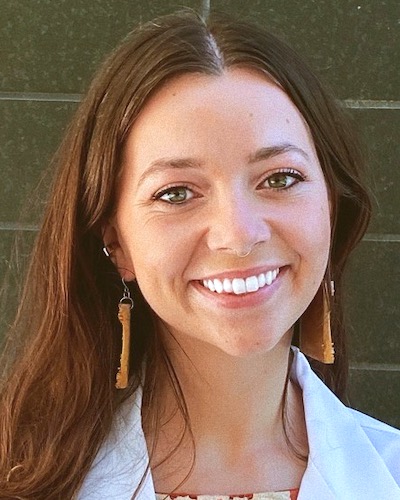
OT school helped me get diagnosed with ADHD (and gain tools to thrive in grad school!) ⟩
October 6, 2022, by Leah
Community Life Hacks School/Life Balance
I have been called “spacey” my entire life. I had a big imagination and could spend hours enjoying my daydreaming, even at the dinner table or in class. I would get lost trying to go to my best friend’s house around the corner, lose everything I owned, and frequently come home from school with bruises I had no idea how I got. But I was also an extremely hard worker and teacher’s pet and did everything to get straight As and every gold star growing up (while being a professional procrastinator). I felt a bit misunderstood by my peers, impacting my mental health, but I continued to blast through life, mostly successful.
When I started OT school, I was shocked at how much harder it felt to manage my education and life with my classic, procrastinate to the last second, memorize everything, and write a paper in 2 hours routine. Graduate school requires a significant amount of self-management and structure for larger, more complex projects.
Of course, at the time, ADHD was getting a lot of attention on social media, and I was shocked at how much it resonated with me, especially ADHD inattentive type in women. A few peers and I began to discuss our shared experiences, bonding over our lifelong “quirks” and growing difficulties managing graduate school. We collectively agreed to contact the student health center. From there, I received a referral for an ADHD evaluation with a psychologist and Lifestyle Redesign.
Firstly, I did get diagnosed with ADHD, inattentive type, woohoo! But more importantly, I began receiving Lifestyle Redesign services, which are covered by student health insurance. There, I learned how to build supportive routines for my eating, sleeping, and home management tasks. We completed activity analyses of my coursework and jobs so I could better plan out my weeks. We discussed environmental supports that I needed to be able to pay attention to tasks and use the Pomodoro method to manage my time. Furthermore, my OT helped my explore my options for accommodations with the USC office of student accommodations. Not only did I get to help develop habits and routines to support my role as a graduate student and young adult navigating a new diagnosis, but I was also able to see how powerful OT can be on the receiving end.
I am grateful for the support USC offers its students, and I highly recommend asking for help when you need it and seeing what resources may be available to you as a student.
⋯
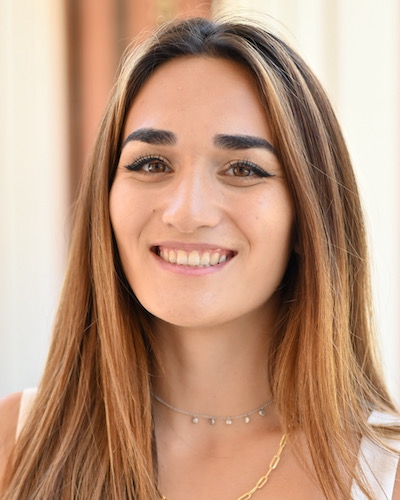
SCHOLARSHIPS, SCHOLARSHIPS, SCHOLARSHIPS! ⟩
September 30, 2022, by Leah Mary
Admissions Life Hacks School/Life Balance
Congratulations! You made it into USC’s Occupational Therapy Program, you should feel incredibly proud of yourself. I have no doubt you will go on and do great things.
But . . . how the heck are you going to pay for this program??? Being a topic program doesn’t come cheap. I wish I had a handbook to guide me when I was first navigating this program. I was often confused from the website and overloaded with information. Because of that, I missed important deadlines for big scholarships. So I find this topic extremely important and I want to make sure that this information is easily digestible and available to students.
I’m going to highlight a couple of websites, scholarships, and strategies.
- Scholarships and awards from USC and other bodies
This link will take you to a comprehensive list of scholarships. It will tell you the amount the award is worth and the eligibility requirements. (I USED THIS SO MUCH.) - OT External Scholarship Opportunities, from Columbia University
This is another website I used from Columbia University with another comprehensive list of scholarships. - Town and gown of USC Scholarship
$15,000 for the academic year for graduate students and PP-OTD students and it is renewable! Deadline for the application is December 1st. - Division Internal Residencies
If you decided to do the PP-OTD and an internal residency, those come with a scholarship of 2/3 tuition. The deadline for the internal residencies is the end of Oct 1st. - Merit-Based Scholarship
If you decide to do the PP-OTD but do an external residency, students admitted to the program will be automatically considered for Merit-based scholarships which cover around 1/3 tuition. - Residencies External to the Chan Division
If you are a licensed and registered therapist by the time of your residency, you can negotiate with the residency sites on paid positions. Don’t be afraid to ask these questions to your site because it is important that both your educational and financial needs are met.
My biggest advice is to apply to everything and ask questions. The famous Michael Scott once said “You miss 100% of the shots you don’t take — Wayne Gretzky.” It’s a funny but very true quote. I know these scholarships take a long time to complete or asking for paid positions during your residency can be an awkward conversation, however if you don’t apply or ask, I can tell you 100% you won’t get them. So I urge you to take those shots.
⋯

Life Goes On ⟩
September 27, 2022, by Mika
Community Diversity International Living in LA School/Life Balance
From the words of the great BTS,
“Life goes on.”
This song lyric often comes to mind while I scroll through videos online that romanticize life abroad, sometimes too much. Don’t get me wrong, having the opportunity to study abroad at a prestigious university is a great honor, especially during the pandemic. I thank the great gods of the universe for helping me manifest this dream. However, things are not always what we imagine, like anything in life. My first month in the States was a rollercoaster of emotions — 30% crying because I miss my home, 20% feels like I’ve been living like a caveman as I explore the wonders of Trader Joe’s and Bath and Body Works, and a great 50% being an absolute FOB* (or in my case, a FOP — Fresh Off the Plane) trying to learn and adapt quickly to an entirely new culture. Believe me, it takes a great deal of cognitive power to constantly convert Fahrenheit and miles to the metric system, understand why cars turn right at a red light, wondering why no one uses the umbrella to shade themselves from the killer heat of LA summer, and try to find the whereabouts of any celebrity visiting LA.
Kidding aside, I think the greatest adjustment I had to deal with as an international student was the grief I felt about the loss of occupations and the usual routines I performed back home. One thing I learned from the pandemic is that grief does not only come in the form of dealing with death; it is also what you feel when you lose anything — a person, a pet, an activity, or an object — that is of value to you. I felt grief because I could no longer walk my dogs and play with them after coming home from work. I could no longer drive to my favorite coffee shops back at home anytime I wanted nor randomly messaged my friends to bike around with me in our neighborhood. I struggled with this feeling mostly when I realized I would no longer see my child clients weekly and feared losing friendships since I’ll be in a time zone different from those I valued most. I often doubted my decision to move and worried that I was wasting my energy, time, and resources.
My perspective of things changed when I recalled one of my favorite quotes by Friedrich Nietzsche: “He who has a why to live can bear almost any how.” My why — my patients and the desire to be a better Occupational Therapist for them — pushed me to refocus my energy back on this ordeal and take things day by day. Slowly, those nights of grief and loneliness turned into nights of endless laughter and amusement as I got into the rhythm of new routines here in LA. Pushing myself to go out of my comfort zone and develop new friendships eventually led me to meet the kindest people. Somehow, they felt like home even if I had just met them.
My first month here in the States taught me that we are where we’re supposed to be and that everything will eventually work out as it should. Life does go on for the better, and if we choose to see the beauty of everyday despite the little adjustments and changes, we move one step closer to who we are meant to be.
*FOB — Fresh off the Boat, A slang term used for someone who recently moved to America
⋯






